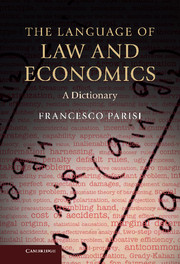T
Published online by Cambridge University Press: 04 August 2017
Summary
Tacit collusion: see cartels and tacit collusion.
Take-it-or-leave-it offer: term (also shortened as tioli offer) used in a variety of contexts in the law and economics literature. The most common use of this term is descriptive of actual contractual practices. In a take-it-or-leave-it contract, one party is dictating all the terms of the contract and the other party has the choice of either accepting the terms of the offer or refusing to contract. This descriptive use of the term refers to all situations in which the offeree has no power to alter the terms of the contract. Standard-form contracts and adhesion contracts can therefore be described as take-it-or-leave-it contracts to emphasize the fact that, in such contracts, one party has greater bargaining power than the other (Kessler, 1943). Cooter and Ulen (2008), in an analysis of Kessler’s work and of tioli contracts, point out that criticisms of take-it-or-leave-it offers are justified when one side has monopolistic bargaining power and is using its power to reduce competition. However, they also note that take-it-orleave-it offers (in the form of standard-form contracts) can at times increase the efficiency of exchange by reducing product differentiation and reducing transaction costs. The second usage of the term is normative, as it identifies take-it-or-leave-it offers as optimal bargaining strategies that should be adopted to maximize payoffs under certain conditions. Game theory helps identify the strengths and weaknesses of these strategies, highlighting the difficulty of precommitting oneself to a no-renegotiation strategy that could give credibility to the “or-leave-it” threat. Finally, the term “take-it-or-leave-it offer” can be found in formal law and economics papers as a modeling short cut to avoid having to employ a formal bargaining game to derive a price, the value of which may be immaterial for the actual analysis. When found in those contexts, a price generated through a take-it-or-leave-it offer is equivalent to an arbitrary price, chosen by the modeler to study the problem at hand.
- Type
- Chapter
- Information
- The Language of Law and EconomicsA Dictionary, pp. 293 - 305Publisher: Cambridge University PressPrint publication year: 2013



